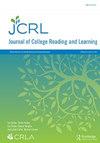Instrucción En Español? A Pilot Study Examining Student and Teacher Perceptions of Using the Mother Tongue as a Tool
Q2 Social Sciences
引用次数: 0
Abstract
Many students visit writing centers to become better writers in the English language. One issue of considerable debate is whether students visiting writing centers along the border should be assisted in Spanish or English. This pilot study examined writing center tutors’ and students’ perceptions of speaking Spanish at the writing center. Most border writing centers do not instruct tutors to use a particular language while working with ESL and non-native English-speaking students. This is due to the lack of research and education regarding the advantages and disadvantages in the use of the mother tongue during a tutoring session. The study served to explore these crucial questions. Results suggested that students and tutors may view the use of Spanish during writing center sessions differently. Most students suggested that using English during the tutoring session was more helpful than using Spanish; however, half of the surveyed tutors felt that the use of the mother tongue (Spanish) helped students feel more comfortable during the session and resulted in a more effective tutoring session.Instrucción恩Español?一项考察学生和教师使用母语作为工具的认知的试点研究
许多学生访问写作中心,以成为更好的英语作家。一个相当有争议的问题是,学生访问沿边界的写作中心是否应协助西班牙语或英语。这项初步研究考察了写作中心导师和学生对在写作中心说西班牙语的看法。大多数边境写作中心在指导ESL和非英语母语学生时,并不指导导师使用特定的语言。这是由于缺乏关于在辅导课上使用母语的利弊的研究和教育。这项研究有助于探索这些关键问题。结果表明,学生和导师在写作中心课程中对西班牙语的使用可能有不同的看法。大多数学生认为在辅导课上使用英语比使用西班牙语更有帮助;然而,接受调查的教师中有一半认为使用母语(西班牙语)有助于学生在教学过程中感到更舒适,从而提高了教学效果。
本文章由计算机程序翻译,如有差异,请以英文原文为准。
求助全文
约1分钟内获得全文
求助全文
来源期刊

Journal of College Reading and Learning
Social Sciences-Linguistics and Language
CiteScore
1.60
自引率
0.00%
发文量
23
期刊介绍:
The Journal of College Reading and Learning (JCRL) invites authors to submit their scholarly research for publication. JCRL is an international forum for the publication of high-quality articles on theory, research, and policy related to areas of developmental education, postsecondary literacy instruction, and learning assistance at the postsecondary level. JCRL is published triannually in the spring, summer, and fall for the College Reading and Learning Association (CRLA). In addition to publishing investigations of the reading, writing, thinking, and studying of college learners, JCRL seeks manuscripts with a college focus on the following topics: effective teaching for struggling learners, learning through new technologies and texts, learning support for culturally and linguistically diverse student populations, and program evaluations of developmental and learning assistance instructional models.
 求助内容:
求助内容: 应助结果提醒方式:
应助结果提醒方式:


